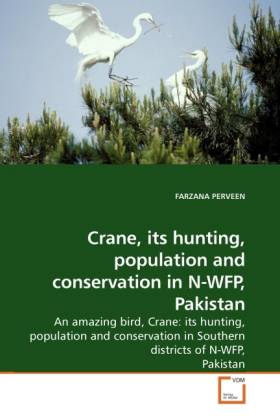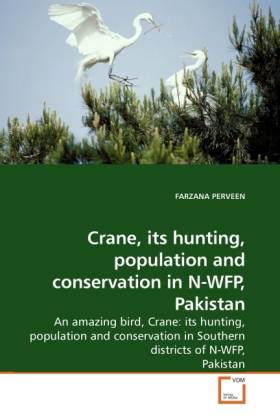
- Afhalen na 1 uur in een winkel met voorraad
- Gratis thuislevering in België vanaf € 30
- Ruim aanbod met 7 miljoen producten
- Afhalen na 1 uur in een winkel met voorraad
- Gratis thuislevering in België vanaf € 30
- Ruim aanbod met 7 miljoen producten
Zoeken
Crane, its hunting, population and conservation in N-WFP, Pakistan
An amazing bird, Crane: its hunting, population and conservation in Southern districts of N-WFP, Pakistan
Farzana Perveen
Paperback | Engels
€ 58,45
+ 116 punten
Omschrijving
The hunting pressure, population and conservation of Cranes were observed in Bannu and Lakki, N-WFP, Pakistan. Field survey, informal discussion, interviews, discussion with community and questionnaire were the tools for data collection. A total of 165 camps were visited in fall, 2007 and 85 in spring, 2008 in Bannu, Lakki and FR Bannu. The total 1650 hunters have 9900 Captive Cranes, of which 6600 Common (Grus grus) and 3300 Demoiselle (Anthropoides virgo). During fall, 2007 and spring, 2008, a total of 2080 Cranes were captured by the hunters at the rate of 08 per camp. Of the total captured 500 were Common and 1580 were Demoiselle. Of the total captured, 290 Common and 915 Demoiselle were in Bannu and 210 and 665 were captured in Lakki, respectively. During fall, 2007 and spring, 2008, a total of 830 Cranes were killed, of which 50 were Common and 785 were Demoiselle. Of the total 45 Common were killed in Bannu and 05 in Lakki, while Demoiselle killed 290 were in Bannu and 210 in Lakki. According to 82% hunters the populations of migratory Cranes are going to decline due to over hunting and destruction of their natural habitats.
Specificaties
Betrokkenen
- Auteur(s):
- Uitgeverij:
Inhoud
- Aantal bladzijden:
- 124
- Taal:
- Engels
Eigenschappen
- Productcode (EAN):
- 9783639231878
- Uitvoering:
- Paperback

Alleen bij Standaard Boekhandel
+ 116 punten op je klantenkaart van Standaard Boekhandel
Beoordelingen
We publiceren alleen reviews die voldoen aan de voorwaarden voor reviews. Bekijk onze voorwaarden voor reviews.








